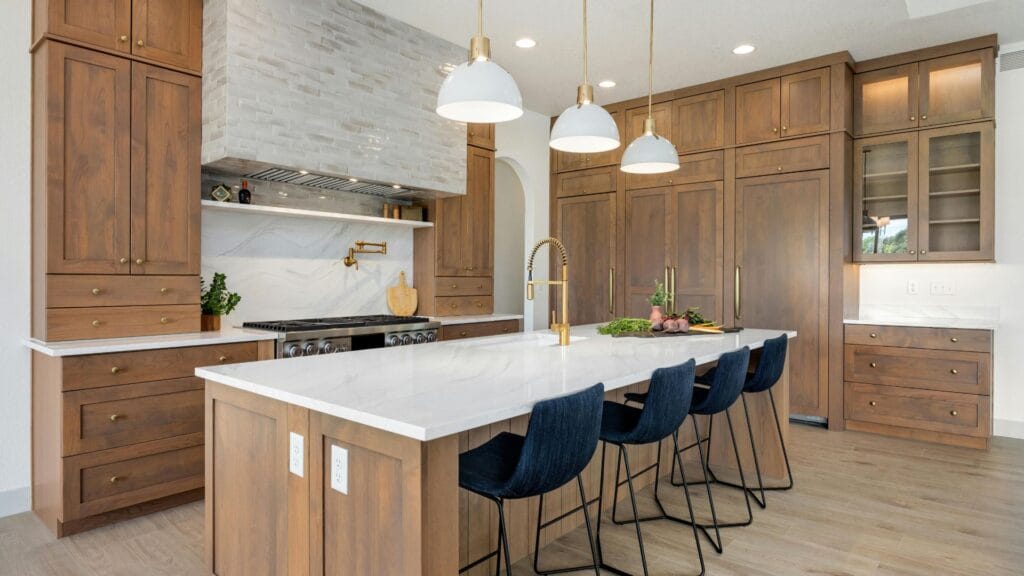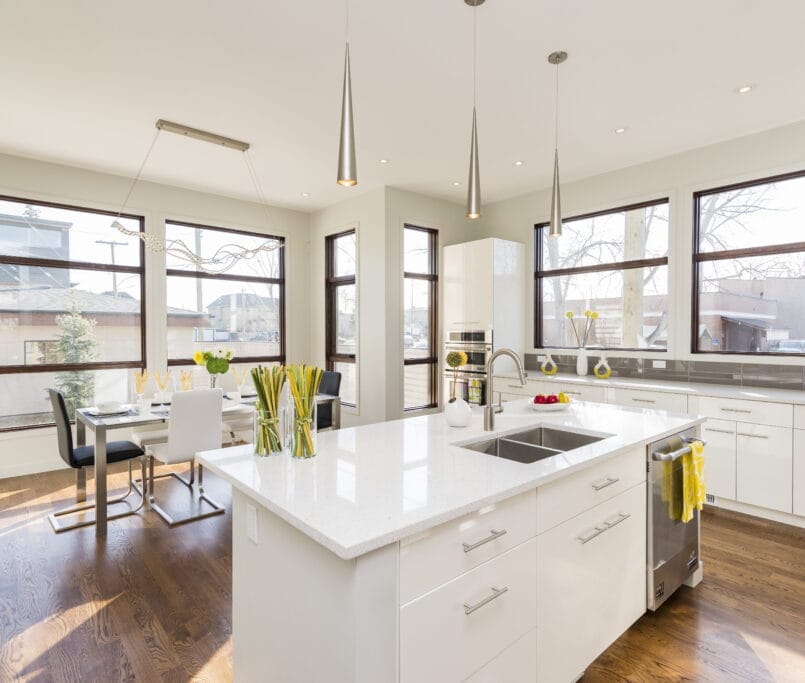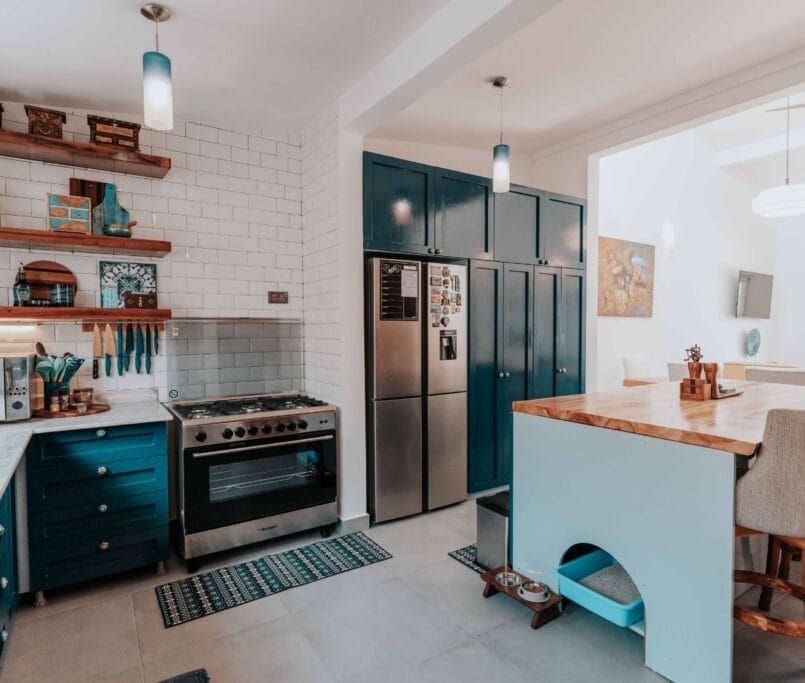Average Kitchen Remodel Timeline (Step-by-Step)
“how long does a kitchen remodel take from start to finish?”
If you ask this question, most experts will tell you that the average kitchen remodel takes anywhere from 6 to 12 weeks. The exact timeline depends on the size of the kitchen, the scope of the remodel, and how quickly materials and approvals come together. In this guide, we’ll walk you through the entire process step-by-step, so you’ll know exactly what to expect at each stage and how to avoid the common delays that can push your project off schedule.
What’s the first step in a kitchen remodel?’ — Planning and Design (2–6 weeks)
Before any demolition starts, your kitchen remodel begins with careful planning. This stage is where you and your designer or contractor create the vision for your new kitchen. It includes measuring your space, deciding on a new layout, and choosing materials like cabinetry, countertops, and flooring.
If you’re working with Grand Building Construction, we’ll also prepare detailed 3D renderings so you can see exactly how your kitchen will look before construction begins. This stage can take as little as two weeks for a straightforward project or up to six weeks for a custom design with multiple revisions. Starting with a solid plan ensures everything runs smoother later on.
What’s the typical order of steps in a kitchen renovation?’ — Permits and Approvals (1–4 weeks)
Not every remodel needs permits, but if you’re moving walls, changing plumbing or electrical layouts, or installing new windows and doors, you’ll likely need approval from your local building authority. This can add one to four weeks to your timeline depending on how quickly your city processes applications.
If you’re part of a Homeowners Association (HOA), you may also need HOA approval, which can add another layer of review. Skipping this step isn’t worth the risk unpermitted work can cause issues when selling your home and may require costly changes later.
What happens before construction starts in a kitchen remodel?’ — Pre-Construction Prep (1 week)
Once your design is approved and permits are in place, it’s time for pre-construction preparations. This is when your contractor orders all the necessary materials, from cabinets and countertops to tiles and lighting fixtures. Appliances should also be scheduled for delivery to line up with the installation phase.
During this week, the crew will set up dust protection for nearby rooms, plan a safe workspace, and confirm the project calendar with all trades involved. Good pre-construction prep helps keep your project running smoothly from day one.
How many weeks does a full kitchen remodel usually take?’ — Demolition (1–2 weeks)
Demolition is where your old kitchen officially says goodbye. This can take anywhere from a few days to two weeks depending on the size of the space and the amount of work needed. Old cabinets, countertops, flooring, and appliances are removed, and any walls or structural elements slated for change are taken down.
If the kitchen is in an older home, demolition can sometimes uncover surprises like outdated wiring or hidden water damage. While this can extend the timeline slightly, addressing these issues now ensures your new kitchen is safe and functional.
What comes after demolition in a kitchen remodel?’ — Structural and Rough-In Work (1–3 weeks)
Once the space is cleared, structural changes and rough-in work begin. This is where framing adjustments, new plumbing lines, updated electrical wiring, and HVAC modifications are completed. These tasks require coordination among different trades and often include city inspections before moving on.
Inspections are a key milestone they ensure everything meets local building codes and prevent costly fixes later. Depending on your location, scheduling and passing inspections can take a few days or up to a week.
When do new cabinets and floors go in during a remodel?’ — Installation Phase (3–6 weeks)
With the groundwork complete, the transformation begins. Cabinet installation is usually first, followed by countertops, backsplash, and flooring. Lighting fixtures and plumbing features like sinks and faucets are installed next, often overlapping with other work to save time.
In a full remodel, this stage can take three to six weeks depending on complexity and whether any custom elements are involved. For example, stone countertops often require precise measurements after cabinets are installed, which can add one to two weeks for fabrication.
What’s the fastest way to finish a kitchen remodel?’ — Final Touches (1 week)
The final touches bring your new kitchen to life. This includes painting walls, installing trim, final appliance hookups, and giving the space a deep clean. At this point, your contractor will schedule a final walkthrough with you to ensure every detail meets your expectations.
If you want to speed up this stage, be decisive about small choices like hardware style and paint colors earlier in the process. Even minor indecision can cause last-minute delays.
What can slow down a kitchen remodel?’ — Common Delays to Watch For
The biggest delays in kitchen remodeling often come from backordered materials, slow permit approvals, scope changes mid-project, and contractor scheduling conflicts. Weather can also play a role if your remodel involves structural changes that open the home to the elements.
To avoid delays, work with a contractor who orders materials early, plans for contingencies, and keeps you informed at every step. At Grand Building Construction, we build realistic timelines with buffer days for unexpected issues, so you stay on track.

Contact Us
Remodeling a kitchen is a major project, but knowing the average timeline helps you plan with confidence. From planning and design to the final walkthrough, most kitchen remodels take 6 to 12 weeks, though complex projects can run longer. The key to staying on schedule is good preparation, prompt decision-making, and working with a skilled team.
If you’re ready to start your kitchen remodel, contact Grand Building Construction today. Our team will guide you through every stage, keep your project on time, and ensure you get the kitchen you’ve always dreamed of.




